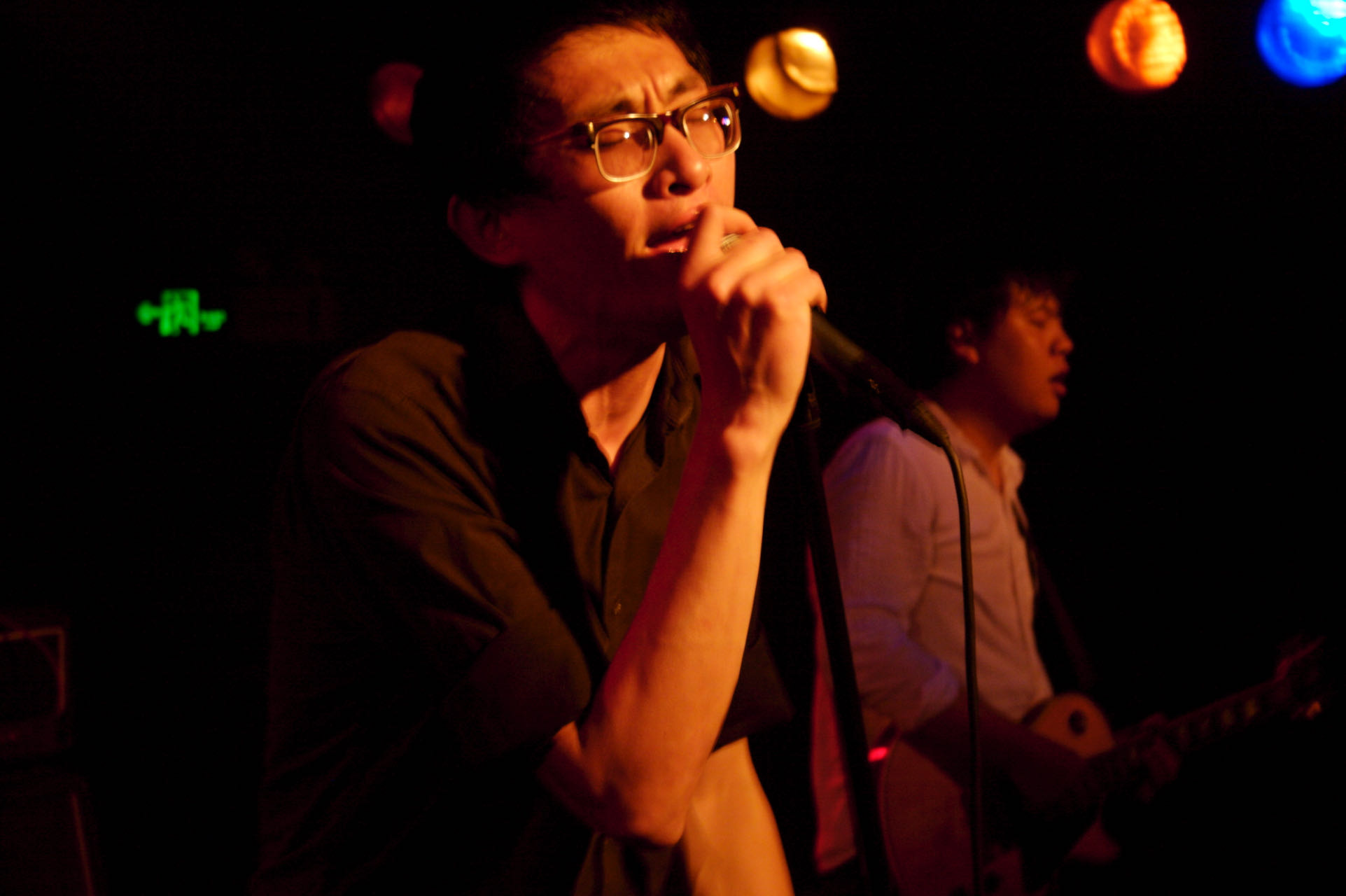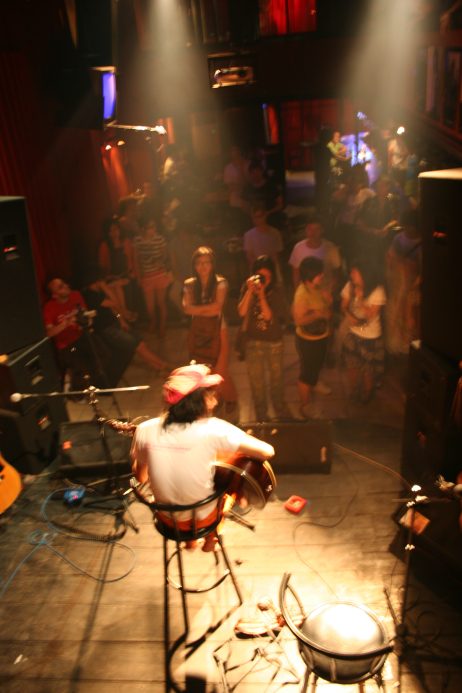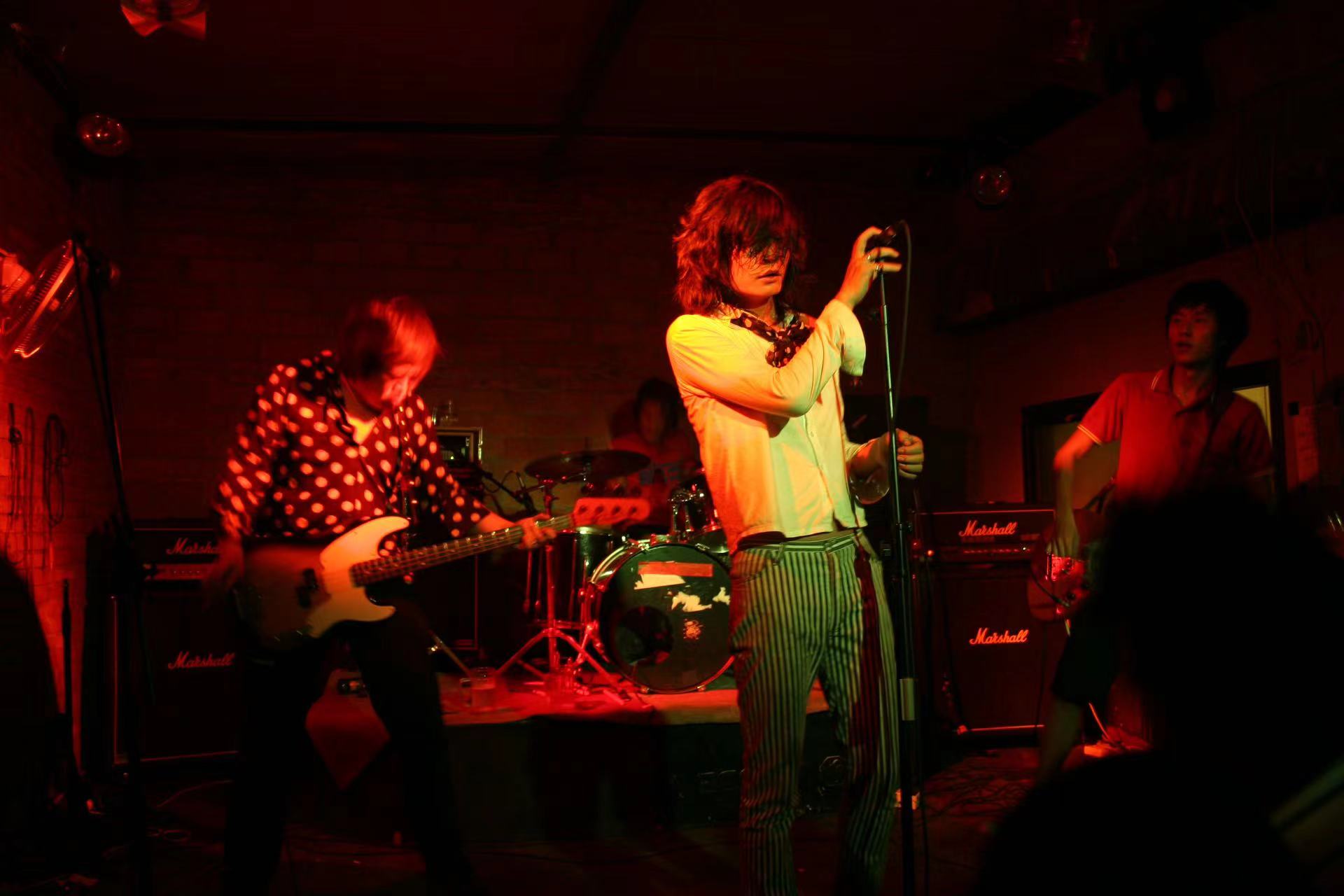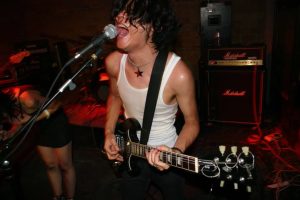During China’s rock (or yaogun, as many young Chinese gig goers call it) boom circa the 2008 Summer Olympics, Andrew Field was a steadfast concert chronicler. From his perch at the side of the stage, Field, an American writer and historian, straddled two worlds, and time and again he panned his camera between them.
Unlike the label and venue-hired throngs of photographers who would crowd the lip of the stage and bring new meaning to the phrase “in your face photos,” Field would often capture the crowd of ecstatic concert goers (a combination of Chinese and expat), then train his lens on the Chinese musicians who were by turns arty, boundary pushing, and hungry members of a nascent scene.
Field released his documentary “Down: Indie Rock in the P.R.C.” in 2012. This spring marked the publishing of Field’s book – full not only of his perceptively framed concert photos, but also his more impressive prose detailing the rapidly unfolding early developments in China’s indie rock scene. Titled “Rocking China,” Field’s book is an instantly essential text for readers eager to learn about a key subculture in one of the world’s most dynamic nations.
One particularly memorable concert when Field bridged the audience-performer gap, camera in hand, was a SUBS show. During an interview with The Diplomat shortly after the book’s release in May, Field recalled seeing, and later writing about, SUBS’ frantic frontwoman Kang Mao. A gripping early chapter of his book detailed her performance at a festival at Dos Kolegas, a now-defunct music haven at a drive-in movie theater park in Beijing, in the summer of 2007.
“She’s doing everything,” Field recalled when asked about SUBS and Kang Mao, describing the memory in present tense as if to convey just how powerful it was. “She’s taunting the audience. Ridiculing them. Pleading with them. She gets down on her hands and knees. Whatever she does is for the audience. And there’s not one moment they don’t feel viscerally connected to her.”
All this – along with “the rhythm and the power of the band’s music” – made SUBS stand out for Field among the abundant bands in China’s scene.
Aside from being entertaining and more than memorable, Kang Mao’s rip-roaring performance style speaks to something much deeper, in Field’s view. “To me the the measure of a good band is how much they could get the audience flowing with some kind of movement. So they aren’t just standing there like zombies. If the lead singer is just standing still, the audience tends to imitate them,” Field said. It is therefore incumbent upon the singer to jump, dance, wave their arms, shout at the audience – do whatever works for them and the crowd, to shake off the proverbial rust. Field deemed “Kang Mao a genius at this. At every SUBS concert, there was no question people were going to be dancing their asses off.”

Kang Mao and Wu Hao of SUBS on a train while on tour. Photo by Andrew Field.
When asked about Field’s description, Kang Mao told The Diplomat that her success as a frontwoman had less to do with being gifted than with following her unique instincts. “It’s not a decision, but something that happens naturally. In other words, why not?”
When thinking back on SUBS’ earliest shows, she said Chinese audiences had yet to see extreme performances. In fact, “They didn’t even know rock and roll at all. On and off the stage, people were calm, polite, and numb. I just had a strong desire to feel my own vitality, and to feel that the audience was alive. I want them to love our music, or hate our music, but not be bored.”
There was no risk of such indifference with Kang Mao pushing the envelope. She told a revealing anecdote: “Once, when preparing to go on stage, I saw a ‘ban’ posted on the stage, prohibiting smoking on the stage, spitting on the stage, climbing on the speaker, prohibiting diving. I said that I have done all these, and the person next to me said, ‘This is for you.’
“For a long time, I thought that one day I would die on stage. This is not a boring way to die.”
Yaogun fans who are nearly as passionate about the artform as Kang Mao (who could match her intensity, after all?) logged onto DJ BO (Brian Offenther’s) Critical Music Club livestream shortly after the book’s release this spring to watch Field attend a live Q&A, hosted by Offenther, at Beijing’s gleefully dive-y Soi Bar. At the event Field answered questions from viewers and on-site audience members.
A few days after that event, the now Shanghai-based Field returned to his old stomping grounds in the Chinese capital, ordering some pints at a Beijing hutong craft beer bar while answering The Diplomat’s questions about his book. He would smile fondly and answer thoughtfully when asked about the concerts that he loved attending and writing about, echoing the keenly observed prose he applied to the book.
He peppered his refreshingly unfussy, often direct, writing style throughout “Rocking China” with a photographer’s eye for details that subtly place the reader in the scenes he’s writing about. Because he has such a flair for it, it can be daunting, but fun, to attempt the same. So here goes: At the Beijing craft beer bar, Field (whose blonde hair and beard are flecked with gray) was wearing a white golf shirt, jean shorts, and reading glasses with nearly transparent frames. As he thought back on the book that he dedicated years to writing, he sat with a not quite rigid, but certainly conscientious, posture that makes one mindful of back injuries and all the heavy cameras Field hoisted in the pre-cell phone age.
Physically burdensome as those cameras could be, Field loved setting up sidestage and capturing the interactions between the musicians and audiences, be it at a leave-it-all-on-the-stage SUBS show or a more cerebral set by the likes of artsy Nanjing hailing rockers P.K.14.

Yang Haisong and P.K.14 at MAO Live House. Photo by Andrew Field.
Having stage access for so many of his interviews, photos, and documentary footage is something Field could never imagine enjoying back in the United States, for fear of bouncers showing him the exit. “There’s no fucking way you would get on a stage with a live band. But in China at that time people did get to know me day in, day out. And they knew I was serious about this. So I met a lot of the band members, and people just kind of took it for granted that there was a foreigner filming and I would get on stage,” he said.
“I wouldn’t get in the way of the band. I’d be on the edge. I’d be careful not to interfere with their connection with the audience. But there were always five other people with cameras, inevitably filming or photographing, usually not on stage but from the front row. And I have no idea what they were filming for, or where their footage ever went.”
After capturing some of the band’s best moments onstage, Field would typically wade into the thick of the crowd, his camera held high above his head to protect it (no wonder he sits with such deliberate posture these days).
“Rocking China” describes concerts at venues as wide ranging as the scrappy Dos Kolegas, the cavernous and graffiti laden Mao Live, and the huge festivals where indie acts began taking their popularity to the next level for the first time. But Field’s book is equally memorable for the intimate interviews he conducted with artists at cafes and bars between gigs. It was during those moments that he became surprised by a latent bond he shared with many of these artists.
Field left an auspicious life in Australia for what he felt was a more exciting return to China years after studying there. His colleagues, not to mention his Chinese in-laws, were surprised, to say the least. After all, he had attained tenure at a university in Sydney, a city he readily admits would have been gorgeously comfortable to settle down in.
But instead, “I was like: ‘Maybe I can pursue my own greedy goal, and not worry about job security or my title.’ You know, we’re all so focused on our titles and our pedigrees, right? It was like I went from being basically a tenured professor to being an adjunct [in China], and kind of threw myself on the gig economy,” he said. He added that there were plenty of opportunities at that time because the study abroad industry was booming, and a number of students were flocking to China.
His own free-spirited experience helped him empathize with Chinese indie rockers, who faced bigger pressures and higher stakes in one of the world’s most competitive education and work environments. “I identified with many of them because they were taking a risk to do something that they love, that they thought was meaningful. It takes a lot of guts to to say ‘I’m taking this path even though there are no guarantees, there’s no security here.’ So I do think that I felt a sense of identification with the people in the scene.”
Aside from identifying with them, Field was also impressed by many of these Chinese rockers’ knowledge. One such musician who stood out: Yang Haisong, the bespectacled and quietly mercurial frontman of ambitiously artsy band P.K.14. “He kind of has a crafted persona. He doesn’t let it all hang out the way some musicians do,” Field recalled of interviewing the P.K.14 singer at a Beijing café nearly 20 years ago. Field was surprised when Yang mentioned Western acts like Bob Dylan and Phil Ochs, the latter of whom he had to look up.
Regardless, Field loved talking about Dylan, and especially Ochs, with Yang. “And it wasn’t the first time that a Chinese musician had schooled me on the history of Western rock and folk music, you know?” Field, who plays guitar and considers himself fairly musically knowledgeable, recalled with a laugh.
Field also sees parallels between Yang’s music and socially conscious folk forebearers like Dylan. In “Rocking China,” he wrote: “Yang Haisong had a husky voice. His singing came across almost like a plea, or a cry for help –with a kind of 1960s protester’s ‘Hey! Listen to what I’ve got to say!’ feel to it.”
When I asked him about this excerpt from the book, Yang laughed and told The Diplomat: “It sounds great!” He slightly adjusted the simile, however, likening his voice less to a plea than a prayer. “Probably all the great music is about prayer – not God or Buddha, but praying to something spiritual.”

Bian Yuan playing at D-22 the unplugged session. Photo by Andrew Field.
Another highlighted episode involved “Billy” Bian Yuan (also known as Shang Huanhuan) of rollicking punk group Joyside playing an acoustic set at legendary, long-since-closed livehouse D-22. Field not only describes that show vividly in his book, but also includes a promo poster for the gig – part of his extensive collection, which he should one day exhibit at a gallery in Beijing’s 798 art district.
“He’s got this reputation of being a rock’n’roll bad boy,” Field recalled of Bian Yuan. “He’s always drunk. Sometimes he was stumbling drunk on the stage and could only slur out his lyrics for all the songs that Joyside used to sing back in those days. It was all about piss and girls and smokes – the immediate stimuli.
“Then, when I saw him at the unplugged concert, it was kind of impromptu because the band that was supposed to show up couldn’t. So they asked him to take over. And he just went through a whole string of songs that he knew all from memory.”
These were by no means run of the mill covers. He chose from all over the 1960s and ‘70s cannon, and some of the songs were even a bit obscure to Field, such as “You Can’t Put Your Arms Around a Memory” by Johnny Thunders.
After the show, when everyone was hanging out outside the club and a girl was hanging off Bian Yuan – “as they all do,” Field remarked – the singer mentioned to Field, “So I guess you’ve seen a different side of me.”
To which Field replied: “You’re damn right.”
Descriptions of such shows, photos from the time, and show posters indeed give “Rocking China” considerable dimension. Aside from the pages dedicated to Bian Yuan unplugged, Field captured him and his Joyside bandmates inspiring an impressive segment of their fanbase in another scene from the book. As the photo caption on that page reads: “The three band members of indie rock band Hedgehog slam dance with other audience members to songs of Joyside at the CH+INDIE fest at 2 Kolegas in July 2007.”
Joyside bassist Liu Hao responded to questions about Atom – the pint-sized drummer of equally beloved but very different band Hedgehog – dancing to his band’s 2007 set. “It was normal for them to pogo at Joyside shows, because I would also jump when they [Hedgehog] were playing.”
Liu Hao pointed out the larger context: There had been transition period a few years prior, when numerous older venues like Happy Land had closed and would-be legendary spots like D-22 and Dos Kolegas had yet to open. Because of that, “Everyone cherished every opportunity to perform, and after the shows everyone was drinking, talking about music. The scene at that time was crazy, crazy. You can’t imagine.”
Field’s book also effectively captures both that excitement and the refreshing lack of drama in Beijing’s music scene in the years following what Liu Hao describes. Field said Dos Kolegas was in particular a supportive environment, calling it “the most laid back, coolest rock club in China at that time.”
Its no frills, music first, genre grab-bag ethos prompted musicians who congregated there to “support each other and you know, the claws went down. Everybody was still, you know, putting their best game out there. But I felt that it was in a climate of mutual support. That the musicians, even if they had different styles and attitudes, recognized the value of everybody else because it just took so much. It was such a huge sacrifice to be part of that scene. So I think everybody had an instant bond.”
“Nowadays, I don’t think the stakes are quite as high for young kids as they were 20 years ago,” Field added.
“I totally agree that point,” said Yang when I asked for his thoughts. “In China rock music was more about lifestyle, values, and the life you choose, and not only music. So basically if you played in a band, or even just listened to rock, it means you’re out of mainstream life, a bit like self-exile into another side. And it makes all musicians feel like an exile family, an outsider community, kind of religious.
“Nowadays I think it has changed a lot – music is just music, entertainment, and also about fame and money sometimes.”

Joyside playing at Dos Kolegas. Photo by Andrew Field.
The eras have certainly changed. Chronicling those differences is something Field and his publisher Graham Earnshaw clearly share a passion for. Earnshaw told The Diplomat that he and Field have much more in common than that, including an interest in China’s cultural scene, its history, the connections between that past and present, and the links between China and the outside world.
Having collaborated on books about old Shanghai over the years, Field felt he and Earnshaw shared the right shorthand for his next book. He gave the British publisher the “Rocking China” manuscript – a segment of which shouts out Earnshaw’s journalism in China, beginning in the late 1970s, and his forming of The Peking All Stars, which performed in the capital in the early 1980s. After reading the manuscript, Earnshaw said “Fantastic. So let’s do it,” he recalled.
Earnshaw told me he found the book compelling: “rock music in China is a very strange animal, a very weird hybrid. And therefore very much worth following up on, as Andrew has done. There are all sorts of influences and connotations to rock in China which Andrew deals with very effectively. It was a crucial era, and [the book] is very enlightening in terms of understanding the shift from what was to what is now.”
Eric de Fontenay, founder of Beijing- and New York-based music touring and promotion agency MusicDish*China, is a current mover and shaker in Beijing’s indie circles who on a daily basis feels the aftershocks of the recent indie boom that Field chronicles in “Rocking China.” De Fontenay tirelessly promotes young talent through his Fresh Out the Pot collective and understands firsthand how the environment has changed since the late ‘00s and early ‘10s.
He therefore loves how Field is “not just telling the story, he’s asking questions. ‘Why did the Beijing scene become what it was? How did it?’ He’s analyzing, and then positing hypotheses as to why those things are happening. I always think that’s great, because I just find China is a place where those stories are not told enough,” de Fontenay said.
Field “really knew and knows the music scene, and speaks Chinese, and was a regular at these concerts,” Earnshaw pointed out. “He’s able to explain it to a wider English audience. He puts it into the context of the times, and asks the right questions of the performers from the perspective of people who are outsiders.”
Eventually, Field hopes to have his book translated into Mandarin and sold in China. That’s something many Chinese gig goers would be interested in (especially because they’ve grown from a niche to the vast viewership of the hit reality TV series “The Big Band”). Aside from that, the subjects of Fields’ book are also keen to read about his interpretation of their contributions to the scene.
Indeed, the first question Yang Haisong asked when The Diplomat interviewed him about the book was if “Rocking China” would be translated into Chinese so that he could dive deeper into it.
Kang Mao shares Yang’s enthusiasm. She hopes that “Rocking China” will be different from other books about the topic, which she feels “may have been edited for commercial purposes, with a one-sided focus. It’s important to have a more objective record from the outside.
“There is so much falsehood in the history books because it is always written by the victors. I hope Andrew and we bands can make a real time machine.”

































